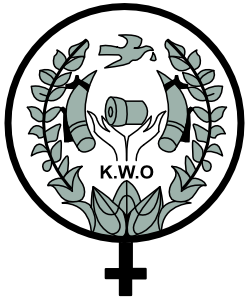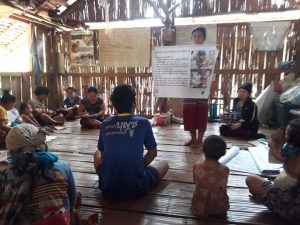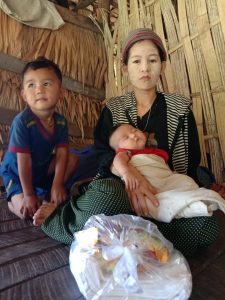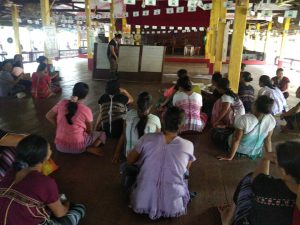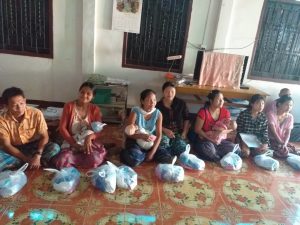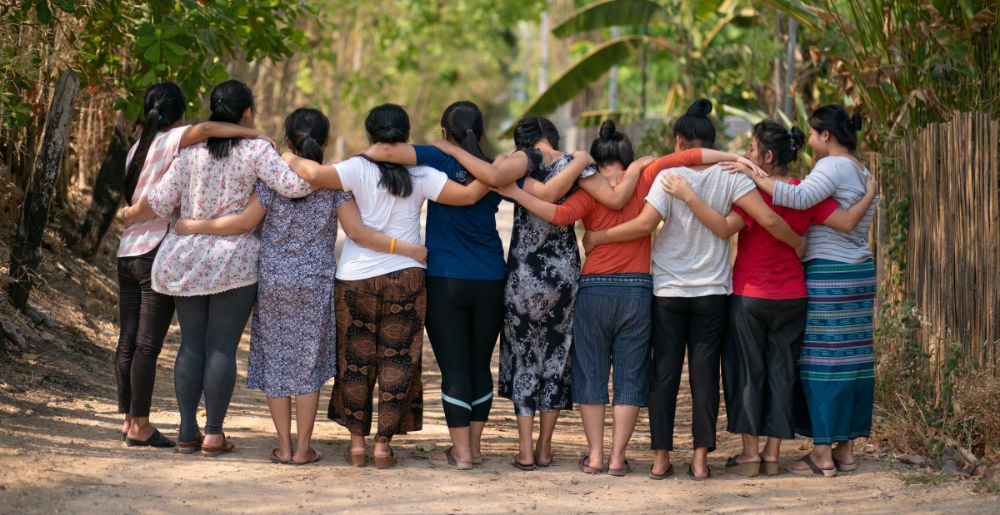There are many obstacles to good health if you live in Burma, and maternal and child health in the ethnic areas is especially poor. Through decades of neglect the health system in Burma ranks among the worst in the world. In the ethnic areas, like Karen State, community-led health initiatives are essential to save lives.
See community reports for analysis of the health situation in Karen State: “The Long Road to Recovery: Ethnic and Community-Based Health Organisations Leading the Way to Better Health in Eastern Burma” and “Diagnosis: Critical. Health and Human Rights in Eastern Burma.”
1. Project Goal
To improve the health and well-being of mothers, infants and village communities in Karen State.
2. Location
We implement this project in as many townships and villages which are safe and accessible in the 7 districts in Karen State in Burma.
3. Overview
Karen village communities have suffered for many years from extreme poverty, lack of basic services, violence and under-development due to the military and political offensive against the ethnic groups in Burma. Women’s health suffers greatly under these conditions and Karen State has one of the highest maternal and neo-natal mortality rates in the world.
Through this project, KWO is able to promote better maternal health in our community. We provide material assistance to mothers with new born babies, and we offer health and nutrition education for women. KWO is not a medical health provider. There are basic health services available and provided by existing ethnic health systems. We co-ordinate with them as often as possible, especially for improving the health of women and children. In recent years we particularly focus on women in the communities who have been displaced by the Burmese military Junta’s violence against civilians.
We distribute Baby Kits to mothers with new born babies, as close as possible to the time of the birth of baby. Our Baby Kits contain laundry soap, body soap, 4 x cloth nappies for swaddling baby, nail clippers, and a health message pamphlet. When we have more funding, we can add other useful items to the Baby Kit, like a replacement sarong for the mother. We are able to distribute Baby Kits in parts of the 7 districts in Karen State, but when there is Burmese Army violence, it is not safe to access all areas.
We also conduct Women’s Health and Nutrition education workshops. Local KWO leaders and trainers run the workshops with mothers and with the broader community. Central level KWO project managers produce teaching and learning materials on a range of topics, and organise to send them to each site for use in the workshops and to display in public spaces in the communities. Health topics include: IYCF (Infant and Young Child Feeding), including breastfeeding, Good health for women during Pregnancy, Delivery, and Maternity, Dispelling Myths around food for pregnant women and for babies, Good Nutrition Practices, Malnutrition, Women’s Health, Family Planning, Drug and Alcohol Abuse, HIV-AIDS, Village and Home Sanitation, Personal Hygiene, Body changes for girls and young women, Hygiene for Women and Girls during Menstruation, Contagious diseases and how to prevent them.
4. Beneficiaries and Participants
In the 2023 project year:
- We ran 130 sessions of maternal and infant health and nutrition awareness raising in villages.
- In total 6,561 people in our communities participated, (5,570 women and 921 men).
- We provided Baby Kits for 1,100 mothers and 1,100 newborn babies.
- KWO leaders in all sites received copies of the “KWO Health Program Guidelines” full of information about local health issues and advice to improve women’s health; copies of the new “Nutrition Education” Pamphlets; and sets of “20 Health Posters”. Used in workshops and for public display.
5. Main Activities
The main activities conducted under this project in 2023:
- Provide women’s, maternal and infant health and nutrition awareness sessions in communities.
- Purchase, pack, and distribute hygiene kits to mothers at the time of baby’s birth, called “Baby Kits”. Hygiene items include: laundry soap, body soap, nail clippers, cloth nappies.
- Develop and produce and distribute health teaching and learning materials.
- Coordination with local leaders and ethnic health service providers like the Karen Department of Health and Welfare, Backpack Health team, or Mae Tao Clinic.
6. Who does the work?
There is one full-time project staff who manages this project, with close collaboration of the KWO Central Executive Committee. The KWO Health Program Co-ordinators in all sites in Karen State implement all the project activities with their KWO team of colleagues.
7. The Impact
General health, sanitation and hygiene improved in all participants, and in the communities of all participating villages. Better nutrition practices became more widely accepted, and this has improved the health especially of women and children.
There is extreme poverty in many Karen rural or remote villages. People cannot afford to buy even simple things like soap or nappies, or those items are simply not available for sale, or there are no shops nearby. Mothers will usually tear up an old sarong to swaddle her new baby. The health and hygiene of women who received Baby Kits, was improved greatly by having soap available for washing herself and clothes/ nappies and having the clean soft “nappy” cloth for swaddling baby. Women become accustomed to the better hygiene and collaborate with other villagers so that soaps can be made available closer to their villages and more regularly. This project has created a big shift in village level hygiene behaviors.
Due to the isolation and restrictions on infrastructure development caused by many years of military rule and conflict in Burma, local communities have also suffered from a lack of information and education about common health problems. For many villagers these KWO health awareness sessions were the first they had ever attended. Behavior changes were observed taking place immediately and in following weeks. Most Karen indigenous knowledge is beneficial and supportive of the individual’s health, however there are some harmful traditional practices, like forbidding certain foods during pregnancy which are in fact very good for mother and baby development. Some of these were addressed in the community health education sessions. Because KWO is part of the community, and held in high regard, the participants were able to trust the new information, accept it more easily, and absorb it into their daily lives.
